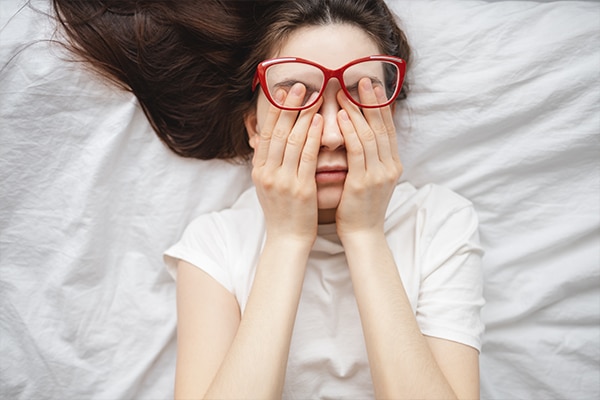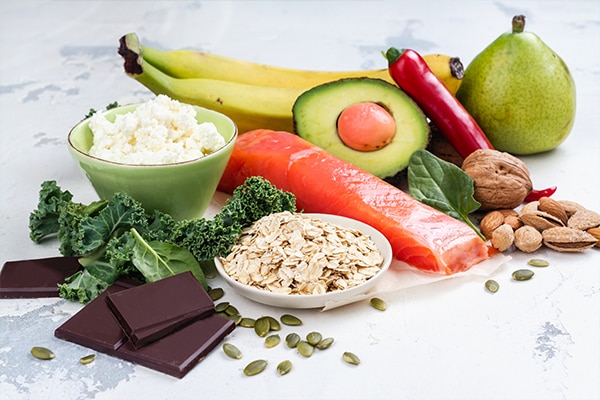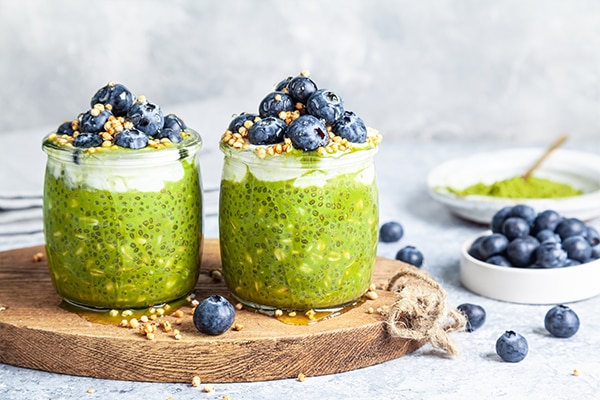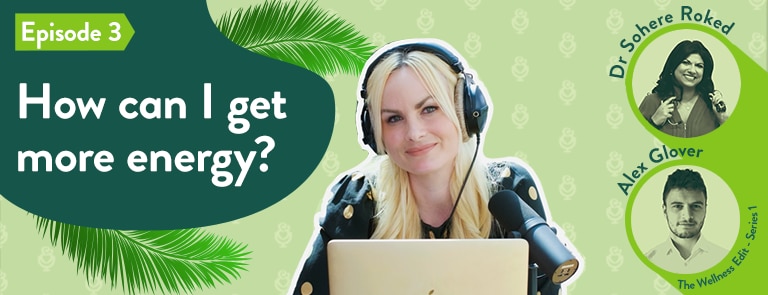10% off £35
Guide to fighting fatigue

Do you always struggle to stay awake while your friend is raring to go? Part of the answer could lie in your DNA, but a whole range of other factors play an important part in how fatigued we feel.
Luckily you can put a stop to extreme tiredness starting today.
Research has revealed those who experience energy slumps may have a gene mutation that controls the amount of energy in our cells. It becomes active when our fuel stores start to deplete, such as during exercise.
If it’s faulty, this process is active even when you’re at rest, making you feel tired even though you’re not doing much. Conditions such as depression, anaemia, fibromyalgia, and an underactive thyroid can also affect your energy levels.1
A lack of iron causes anaemia, so up your intake of iron-rich foods like lean red meat and broccoli, while an iron supplement may also help.
An underactive thyroid causes everything to slow down, so tiredness is a common symptom. Ask your GP for a test if you suffer from weight gain, sensitivity to cold and irregular periods too.
If you live with fibromyalgia, you may experience a range of different symptoms, and fatigue can be one of them.2
Fatigue can vary from person to person, with some feeling mild tiredness to feeling completely exhausted with no energy to do anything.


Your body clock could also trigger fatigue. We now spend most of our time indoors, under office lighting, so we’re not exposed to the natural daylight our body clock needs.
This has a knock-on effect on our sleep quality, which could trigger insomnia.3
If you’re suffering from persistent tiredness, which doesn’t improve with sleep or gets worse with exercise, it could be chronic fatigue syndrome (CFS).
You might also experience problems concentrating, a sore throat, tender lymph nodes, dizziness, and joint pain.4
If you’ve felt this way for at least four months, ask your GP to carry out some tests to rule out CFS.
Handpicked content: Natural sleep remedies - How to get a better night's sleep
If you find yourself waking up tired in the morning, even after a good night’s sleep, you can feel groggy and irritable all day.
There could be several reasons for waking up tired, from your alarm clock to insomnia and sleep inertia.
Most of us use an alarm clock to stop us from oversleeping, but your alarm clock could be making you feel more tired!
In the last hour or so of sleep, our cortisol levels rise naturally, and we move into a period of lighter sleep to prepare us to wake up.
But sometimes, when we use an alarm, it can go off whilst we are still in a deep sleep, causing us to feel groggy in the morning.5
If you need an alarm clock, you could figure out your optimal time to wake up using your sleep cycle, so you’ll be more likely to wake up during a period of lighter sleep.
Simply work back around 7½ hours from when you need to wake up, and this is around when you need to be heading off to sleep.
Feeling tired in the morning can also be because of sleep inertia.
Sleep inertia is the natural feeling you have as you move from being asleep to being awake and could very well be why you wake up tired after 8 hours of sleep.
It generally goes away after around 30 minutes, but it can last longer for some people and affect your motor and cognitive skills.6
Some sleep conditions, like insomnia, can affect how you feel when you wake up in the morning.
Insomnia often means you have trouble falling and staying asleep, so you get fewer hours of good quality sleep at night. As a result, you can end up feeling sleepy all the time.
Insomnia can be short-term or long-term, dependent on its cause, but if you find your insomnia lasts at least three nights a week for three months or more, you should speak to your doctor.
How to not fall asleep: the best ways to boost your energy
How to not fall asleep: the best ways to boost your energy
Getting less sleep at night can make you always tired and sleepy, and not everyone can take a nap during the day to combat excessive sleepiness.
There are simple tricks you can try if you do start to feel sleepy during the day. These include:7


Sugary foods can play havoc with energy levels, sending blood glucose levels soaring and then crashing again.
Go for foods low on the glycaemic index (GI), such as wholegrain bread and brown rice, to help stabilise your blood glucose.
Try to get as much daylight as possible – especially in the mornings – to help reset your body clock and avoid caffeine at night.
Try taking valerian root if you’re still having trouble sleeping. The traditional herbal remedy is often used to help relieve sleeping problems caused by mild anxiety.
The more you sit around, the more sluggish you’ll become. Low energy is a common side effect of poor fitness levels, but exercise is also a great way to balance stress hormones like cortisol.
Exercising can also help relieve pain symptoms you may experience if you are living with certain long-term health conditions, such as fibromyalgia or arthritis.
Give Siberian ginseng a go– the herb is popular for its ability to increase the body’s resistance in coping with both physical and emotional stress, reducing fatigue.
Have you ever wanted to fall asleep after eating a big meal? Don’t worry, us too! Research has shown that eating meals that are high in fats, carbohydrates, or calories are more likely to make us feel sleepy.8
So, eating small meals and snacks can help to keep your energy up. Experts recommend four to six small meals daily, including healthy snacks, to help keep your blood glucose steady.8
Protein shakes, protein bars, or a handful of unsalted nuts make great snacking options and are ideal before any exercise.
Foods that can help fight fatigue
Foods that can help fight fatigue
We know there are plenty of foods we can eat to help us sleep , but what about foods we can eat to help us feel more awake?
Eating small meals and snacks throughout the day is important to avoid blood sugar slumps, fight fatigue and keep your energy up from dawn till dusk.
But what you eat is just as important as when you eat it. So, include these energy boosters in your daily diet, and you’ll be raring to go all day.


A study found that certain compounds in beetroot, called nitrates, help dilate blood vessels and get more oxygen into your muscles.
This could improve your stamina during exercise, so you can keep working out for longer.
Drinking beetroot juice was found to have the same effect as eating the vegetable, or try it roasted and served with goat’s cheese and a sprinkle of walnuts.
It may be almost 90% saturated fat, but most coconut oil is made up of medium-chain triglycerides, which provide energy in the same way as carbohydrates, so it’s a great energy booster.
Just watch the calorie content, as, like all fats, there are nine per gram. Spread it on your toast, fry your food with it, or use it in cakes – it’s incredibly versatile.
Feeling sleepy? Try eating some chestnuts.
They’re high in fibre and rich in starchy carbohydrates, the body’s preferred source of fuel.
And because they’re so low in fat, they’re lower in calories than other nuts, like almonds or cashews. Roast some with a coating of honey or use it in a tasty stuffing.
A sprinkle of these can help fuel you during the day.
Hemp seeds are a great source of omega-3 and omega-6 essential fatty acids, plus they’re also rich in protein and fibre, so this nutritious combo will keep you going for longer and stave off those hunger pangs.
A spoonful on your cereal or used in baking will lower a meal’s glycaemic index (GI) and make it extra-filling.
Instead of a coffee to pep you up, try matcha. It’s made from tea grown in the shade for weeks, dried, and then powdered. It has 137 times the antioxidants of green tea and contains l-thianine, an amino acid that helps calm the central nervous system.
Add a scoop of powder to a smoothie to help you relax throughout the day.
Best vitamins for fatigue
There are a handful of fatigue-fighting vitamins and supplements which may increase your energy levels. These include:
Vitamin B12 is vital for several everyday bodily functions, from helping create new red blood cells to releasing energy after eating. Great sources of it include eggs, salmon, cheese, meat, milk, and cereals.
As B12 is typically found in meat, fish, or dairy, it’s not uncommon for vegans to be deficient. A lack of B12 can be dangerous and lead to conditions like anaemia. If you think you might be deficient, speak to your GP about taking supplements or altering your diet.
Iron is a popular supplement for those who feel low on energy, especially women who are statistically more likely to be deficient.
As your body can’t remove extra iron naturally, it’s important to take only iron supplements if you’re deficient and have been advised to by a doctor.
There are other vitamins in the B family which can help combat tiredness.
A complex vitamin B supplement will contain a variety of these, including B3, which supports brain function and B6, which helps the body turn carbohydrates and protein into energy.
If you’d rather take a herbal supplement, ginseng is a safe option. The plant has been used for centuries, with some studies showing it can support brain function and reduce fatigue.
You can buy it in tablet form or drink it as a tea.
As most people should be able to get these vitamins through their diet, it’s always best to consult a medical professional before you start taking a supplement.
The final say
Sleep is essential but feeling sleepy all the time can make us feel groggy, irritable and can even sometimes be dangerous!
If you find yourself always tired and sleepy even after a good night’s sleep, try these fatigue-fighting tips and tricks and combat any excessive daytime sleepiness.
How can I get more energy?
Need a boost? We all know the feeling when we’re lacking in energy and get-up-and-go, which can be particularly acute in the winter. In this episode, we’ll look at simple ways to get more energy from:
- The foods we eat.
- Exercises and fitness.
- How we can supplement.


- https://www.parsleyhealth.com/blog/8-causes-behind-fatigue-anxiety-depression/
- https://www.nhs.uk/conditions/fibromyalgia/symptoms/
- https://www.sleepfoundation.org/bedroom-environment/light-and-sleep
- https://www.cdc.gov/me-cfs/symptoms-diagnosis/symptoms.html
- https://www.headspace.com/sleep/why-do-i-wake-up-tired
- https://pubmed.ncbi.nlm.nih.gov/25773686/
- https://www.salemhealth.org/services/sleep/how-to-stay-awake-naturally
- https://pubmed.ncbi.nlm.nih.gov/22547886/
The advice in this article is for information only and should not replace medical care. Please check with your GP or healthcare professional before trying any supplements, treatments or remedies. Food supplements must not be used as a substitute for a varied and balanced diet and a healthy lifestyle.














